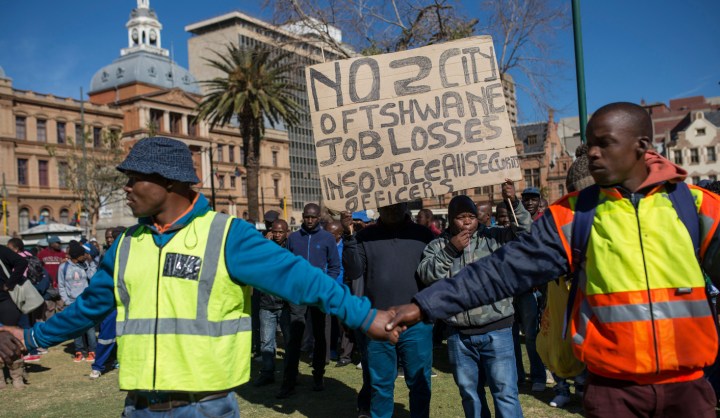South Africa
Outsourcing: Protesting guards demand job security in Tshwane

On Monday security guards in Pretoria continued their fight against outsourcing by the Tshwane metro by occupying a space outside the offices of mayor, Solly Msimanga. The security guards stand to lose their jobs in a few months as the contacts which their employers have with the City of Tshwane will expire. By IHSAAN HAFFEJEE.
An illegal march in the City of Tshwane on Monday forced police to close the usually busy Madiba Street as the protesting security guards refused to move until they were granted a meeting with the mayor.
Earlier in the day the disgruntled security guards gathered at Church Square before deciding to march to the office of the mayor, located at Tshwane House. Metro police indicated that they had not received notice from the group and as such permission was denied for the march. Protesters however ignored the police and proceeded to the mayors office anyway.
According to Austin Mofya from the General Industries Workers Union of South Africa (GIWUSA), the union representing the majority of the security guards, there are about 25 security companies that employ about 3,000 security guards who provide security at various municipal buildings and facilities around Tshwane.
But these guards stand to lose their jobs in a few months as the contacts which their employers have with the City of Tshwane will expire because their contracts were signed under the ANC administration, Mofya said.
“The mayor is the one who has made the decision that these workers must be jobless. We want him to withdraw from his decision. There are other ways in dealing with this instead of harshly terminating the contracts of the employees,” said Mofya, adding that the mayor had failed to meet with the workers’ committee.
The security guards are demanding:
- An end to the outsourcing arrangement;
- To be permanently employed by the City of Tshwane; and
- For those workers who have already been retrenched to be re-employed.
Recently retrenched security guard Andries Masekwa, who was part of the protest, said: “On the 30 June I was given a letter by my employer to say the job was over. As I am standing here I am jobless. My wife is pregnant so I am in a very difficult situation.” Masekwa was a guard at a clinic in Atteridgeville, a township west of Pretoria. “I’m the only breadwinner at home so I have a great feeling of sadness. I also look after my younger siblings by sending money home to the Free State. I haven’t as yet told them that I am no longer working because I do not want to cause them more pain. I just hope that some sort of agreement can be reached with the municipality.”
Isaac Ngwenya, a leader in the committee representing the security guards, claimed the mayor has been refusing to meet with the leadership to discuss a a way forward. “If the mayor is going to retrench 3,000 workers our children are going to suffer. It seems the mayor is a coward as he even refuses to meet with us,” said Ngwenya. “If the mayor does not respond to our demands it’s going to be a very, very big disaster. Our people will become more angry and we will intensify our protest.”
Msimanga was not available to address the workers on Monday but in a statement released later in the day, he said: “Today’s protest action comes as a surprise. In dealing with the issue of security guards it is important to note that the city could not continue paying in excess of R200-million a year to the existing security companies. It is well known that R200-million a year is simply unsustainable for the city when there are other, more affordable options at our disposal.”
According to the Sowetan, Tshwane will start posting its metro police to guard its properties by the end of this month.
A mass meeting by the security guards was being planned to discuss the way forward. DM
Photo: Hundreds of security guards marched to the Tshwane mayor, Solly Msimanga’s office on Monday to demand an end to outsourcing by the metro. Photo: Ihsaan Haffejee


















 Become an Insider
Become an Insider